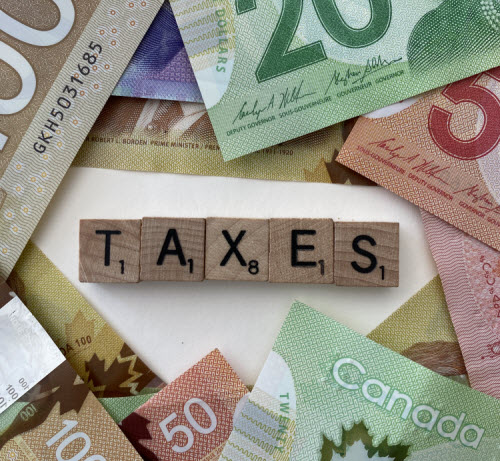Tax Season Is Coming. Are You Ready?
By Pamela Wong
Pamela is a Trained Professional Organizer based in Oakville, Ontario and is the owner of Zen N Organized. She helps homeowners and small business owners transform their homes and home offices into organized spaces. She has a practical, non-judgemental approach to organizing. Her objective is to create functional and harmonious spaces for her clients.

Perhaps your New Year’s resolution is to get a head start on things and be proactive, or maybe you want to regain control of a certain aspect of your life that has been bothering you for a long time.
No matter the reason, if you clicked on this blog post then you have chosen to take the first step in getting your taxes ready. This is something that needs to be done every year and for most people, it’s one of the most dreaded items on their to do list.
In addition to paying income taxes and getting their accountants to file taxes for them, many of my clients are spending extra money to have their accountants sort through the papers and receipts every year. They would rather save the money from those accounting fees but are overwhelmed with the boxes of papers and receipts in their home offices, and they don’t know where to start.
The truth is, paying your accountant to sort through the stacks of papers and receipts can be avoided. There is a more efficient and cheaper solution that causes less stress.
Why Get Prepared?
You are super busy with your family and work, you don’t need to add more stress to your already stressful lives. You can’t waste more time when you already don’t have even time to do everything that you want to do.
Not preparing for your taxes can lead to problems with:
- Stress
- Negativity and mental health
- Wasted Time
- Wasted Money
- Clutter – both physical and mental
- Embarrassment
- Not finding what your accountant is asking for
- Tax returns are filed late
Steps To Get Prepared?
1. Break it Down and Have a Plan
My clients often struggle with tax preparation as the piles of receipts and papers are often associated with a negative feeling. They know it is something that must be done but they don’t know where to start. And, yes, it can be a daunting task if there is no plan.
But if we break it down into smaller, manageable steps and focus on one thing at a time, then the entire process will be less intimidating.
Setting up SMART* goals and having actionable steps towards achieving those goals will help alleviate a lot of overwhelm and stress. Determine: What you are trying to achieve? What are the tasks involved? What is needed to complete those tasks? When do you need to complete them by?
*SMART goals must be specific, measurable, attainable, realistic, and timely. Here’s a Wikipedia explanation of it: https://en.wikipedia.org/wiki/SMART_criteria
2. Categorize
Now that you have a plan, you are ready to start, right? Well, not yet! You are going to need to know how to categorize each piece of paper.
You can sort your documents based on the simple idea below and save yourself a lot of time. Your accountant will be able to do his job a lot faster (which ultimately saves you money).
Starting point
+ revenues
– expenses
= profits (losses)
It is a basic concept. It is not intimidating. Right?
I find that as soon as I explain this to my clients, I can almost hear their internal sigh of relief!
So, what is a good starting point? Last year’s Notice of Assessment. This document provides your accountant with a quick summary of the financial activities from the previous year and can use this as the basis.
From here, each document will be related to a revenue or an expense. Subcategories should be based on the government’s website, and your accountant may tweak it based on your unique circumstances.
My clients know that there is still a lot of paper to go through, but now that they have a better understanding, it is not as daunting as before.
3. Systemize
Create a simple system that works for you, year after year.
If you like the documents in an accordion file so they don’t fall out, that’s fine. If you prefer a binder style with sheet protectors for the documents, that’s fine too. Or maybe you prefer to scan all documents and save them in cloud storage so you can share with your accountant immediately. Do what work best for you and don’t make it complicated.
The key is to label each slot, each zipper pocket, or each shared folder properly so that you and your accountant can find everything easily.
Need help with proper file names and naming conventions? Check out my other blogpost:
4. Keep it simple
I cannot emphasize this more. Keep it simple! Here’s what happened with one of my clients:
She loved physical papers and had created many folders for the different types of documents. The problem was that there were too many categories to the point that she was getting herself confused. There were also duplicates and triplicates of every document. Some were hard copies while others were digitized. File names were not consistent, and documents were filed incorrectly. You can probably imagine her frustration and the amount of time wasted in trying to find things. When she finally contacted me, I worked with her to create a new, simple system that works for her.
5. Stay on top of it (Ask for Help)
Finding the time to do this is probably the toughest step for most people. Depending on your circumstances, try and schedule a little bit of time once a week or once a month so you can stay on top of it. I will assure you that if you have steps 1 to 4 above in place already, it will be a lot easier and will take a lot less time.
But sometimes, life happens.
It is ok to ask for help every now and again. You may have to care for a sick family member, or other life changing events. Or maybe you are just too busy. If asking for help can alleviate your stress, then go for it. It’s ok. There’s no judgement here.
Positive Effects of Staying Organized on Your Tax Documents
Your unorderly paper mountain has now disappeared, and you no longer need to worry about unexpected visitors. Your accountant’s request for a particular document will no longer be met with “Oh no, I have no idea where it is!” but instead, you will know exactly where to find it. I don’t think I need to elaborate anymore.
Here are some of the positives of being prepared for the tax season:
- Less stress and the negative feeling that’s associated of the word “taxes”.
- No more wasted time and effort – Now you have more time doing the things you’d rather be doing.
- No more embarrassment of physical clutter.
- No more embarrassment of not being able to find things.
- Save money – When your tax related documents are in order, your accountant will need less time. You will be able to file your taxes on time.
“Keep It Simple And Do The Work” ~Michele Quan, Ceramicist from Brooklyn, New York
I believe Michele Quan’s quote is perfect for tax preparation.
Although there is no magic wand to get this all done in a split second, you now understand what needs to be done, how to make it more manageable and the steps involved.
Let me know how your tax preparation process is going. I’d love to hear from you.



